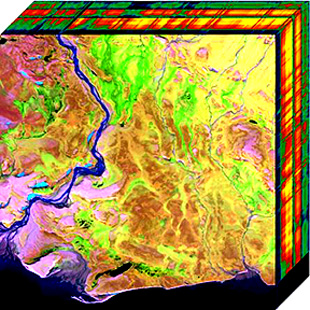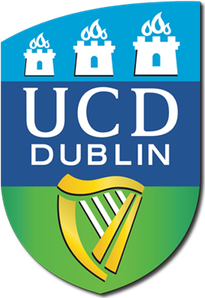Related Research Articles

Raman spectroscopy is a spectroscopic technique typically used to determine vibrational modes of molecules, although rotational and other low-frequency modes of systems may also be observed. Raman spectroscopy is commonly used in chemistry to provide a structural fingerprint by which molecules can be identified.

Dublin City University is a university based on the Northside of Dublin, Ireland. Created as the National Institute for Higher Education, Dublin in 1975, it enrolled its first students in 1980, and was elevated to university status in September 1989 by statute.

Third-level education in the Republic of Ireland includes all education after second-level, encompassing higher education in universities and colleges and further education on Post Leaving Certificate (PLC) and other courses.
Sorel cement is a non-hydraulic cement first produced by the French chemist Stanislas Sorel in 1867.

Hyperspectral imaging collects and processes information from across the electromagnetic spectrum. The goal of hyperspectral imaging is to obtain the spectrum for each pixel in the image of a scene, with the purpose of finding objects, identifying materials, or detecting processes. There are three general types of spectral imagers. There are push broom scanners and the related whisk broom scanners, which read images over time, band sequential scanners, which acquire images of an area at different wavelengths, and snapshot hyperspectral imagers, which uses a staring array to generate an image in an instant.
Chemical imaging is the analytical capability to create a visual image of components distribution from simultaneous measurement of spectra and spatial, time information. Hyperspectral imaging measures contiguous spectral bands, as opposed to multispectral imaging which measures spaced spectral bands.
Dublin City University Gaelic Athletic Association Club is the GAA club at Dublin City University. The club fields teams in men's Gaelic football, hurling, ladies' Gaelic football and camogie. It also organises Gaelic handball. The club mainly competes in intervarsity competitions such as the Sigerson Cup, the Fitzgibbon Cup, the O'Connor Cup and the Ashbourne Cup. DCU has also entered competitions organised by the Leinster GAA, including the O'Byrne Cup, the Kehoe Cup and Walsh Cup. In 2016 St. Patrick's College, Drumcondra merged with Dublin City University. As a result some DCU GAA teams, especially reserve teams, compete as DCU St Patrick's or DCU Dóchas Éireann.

The Ashbourne Cup is an Irish camogie tournament played each year to determine the national champion university or third level college. The Ashbourne Cup is the highest division in inter-collegiate camogie. The competition features many of the current stars of the game and is sometimes known as the 'Olympics of Camogie' because of the disproportionate number of All Star and All-Ireland elite level players who participate each year Since 1972 it has been administered by the Higher EducationArchived 31 May 2011 at the Wayback Machine committee of the Camogie Association. TU Dublin are the current champions, having won the Ashbourne cup in 2023.
The 2010 Ashbourne Cup inter-collegiate camogie championship was staged at the Cork IT sports complex in Bishopstown, Cork over the weekend of 20–21 February. It was won by Waterford Institute of Technology who defeated University College Cork in the final by two points, a repeat of the pairing and result, though not the margin of victory, of the 1999 final. Player of the tournament was WIT's Katrina Parrock.
Tia Emmetine Keyes is a professor of physical chemistry at the School of Chemical Sciences, and a member of the National Centre for Sensor Research at Dublin City University.
The 2011 Ashbourne Cup inter-collegiate camogie championship was staged at the NUIG sports complex in Dangan, Galway over the weekend of February 19–20 with the finals in Pearse Stadium, Salthill. It was won by Waterford Institute of Technology who defeated University College Cork in the final by eight points, a repeat of the pairing and result, though not the margin of victory, of the 1999 final and 2010 final. Player of the tournament was WIT's Katrina Parrock.
Máirtín Mac Con Iomaire is an Irish lecturer and professional chef. He was awarded Ireland's first PhD on food history, in October 2009.
The 2012 Ashbourne Cup inter-collegiate camogie championship was staged at the Waterford IT sports complex in Carraiganore over the weekend of 18–19 February. It was won for the fourth time in succession by Waterford Institute of Technology, after defeating University of Limerick in the final by ten points after UL's semi-final victory over Waterford's opponents in the 2010 and 2011 finals. Player of the tournament was WIT's Katrina Parrock.

University College Dublin is a public research university in Dublin, Ireland, and a member institution of the National University of Ireland. With 38,417 students, it is Ireland's largest university, and amongst the most prestigious universities in Europe. Five Nobel Laureates are among UCD's alumni and current and former staff. Additionally, four Taoisigh and three Irish Presidents have graduated from UCD, along with one President of India.
Magnesium hydroxychloride is the traditional term for several chemical compounds of magnesium, chlorine, oxygen, and hydrogen whose general formula xMgO·yMgCl2·zH2O, for various values of x, y, and z; or, equivalently, Mgx+y(OH)2xCl2y(H2O)z−x. The simple chemical formula that is often used is Mg(OH)Cl, which appears in high school subject, for example.Other names for this class are magnesium chloride hydroxide, magnesium oxychloride, and basic magnesium chloride. Some of these compounds are major components of Sorel cement.

Aoife McLysaght is an Irish geneticist and a professor in the Molecular Evolution Laboratory of the Smurfit Institute of Genetics, Trinity College Dublin in Ireland.

Technological University Dublin or TU Dublin is Ireland's first technological university, established on 1 January 2019, and with a history stretching back to 1887 through the amalgamated Dublin Institute of Technology which progressed from the first technical education institution in Ireland, the City of Dublin Technical Schools. It is the second-largest third-level institution in Ireland, with a student population of 28,500.
Caitríona Lally is a professor of Bioengineering in Trinity College, Dublin. She has been a qualified mechanical engineer since 1997. She did a PhD in cardiovascular biomechanics.
The HEC O'Connor Cup, also referred to as the Michael O'Connor Cup, is the senior Ladies' Gaelic football intervarsity cup competition. It features teams representing universities and institutes of technology from the Republic of Ireland and Northern Ireland. It is organised by the Higher Education Colleges committee of the Ladies' Gaelic Football Association. Mary Immaculate College won the inaugural competition in 1987. University of Limerick is the competition's most successful team. Since 2018 the O'Connor Cup has been sponsored by Gourmet Food Parlour. It was previously sponsored by the Irish Examiner. During the 2010s, the O'Connor Cup final has been broadcast live by TG4 and/or YouTube. Since 1993 teams knocked out in the early rounds of the O'Connor Cup have subsequently competed in the consolation competition, the O'Connor Shield.
The 2019 HEC O'Connor Cup was won by University of Limerick who defeated UCD by 2–16 to 1–10 in the final. Six teams were invited to take part in the competition. Queen's University and UCC reached the semi-finals while DCU defeated NUI Galway by 3–18 to 0–6 to win the Michael O'Connor Shield.
References
- ↑ Gowen, Aoife. "Aoife Gowen Bio". Ucd.ie. Retrieved 4 October 2019.
- ↑ Gowen, Aoife. "Bio". DIT.ie. Retrieved 4 October 2019.
- ↑ Gowen, Aoife. "News" (PDF). DIT.ie. Retrieved 4 October 2019.
- ↑ Gowen, Aoife. "Aoife Gowen". silicon republic. Retrieved 4 October 2019.
- ↑ Gowen, Aoife. "Aoife Gowen". accenture.com. Retrieved 4 October 2019.
- ↑ Ronan M. Dorrepaal and Aoife A. Gowen (2018): "Identification of Magnesium Oxychloride Cement Biomaterial Heterogeneity using Raman Chemical Mapping and NIR Hyperspectral Chemical Imaging"
- ↑ Gowen, Aoife. "Aoife Gowen Bio". Ucd.ie. Retrieved 4 November 2019.
- ↑ "25 of Ireland's phenomenal women of engineering". siliconrepublic.com. Silicone Republic. 8 March 2017. Retrieved 28 October 2018.
- ↑ Gowen, Aoife. "Aoife Gowen". accenture.com. Retrieved 4 November 2019.
- ↑ Bio, Aofie Gowen. "Education". ucd.ie. Retrieved 4 November 2019.